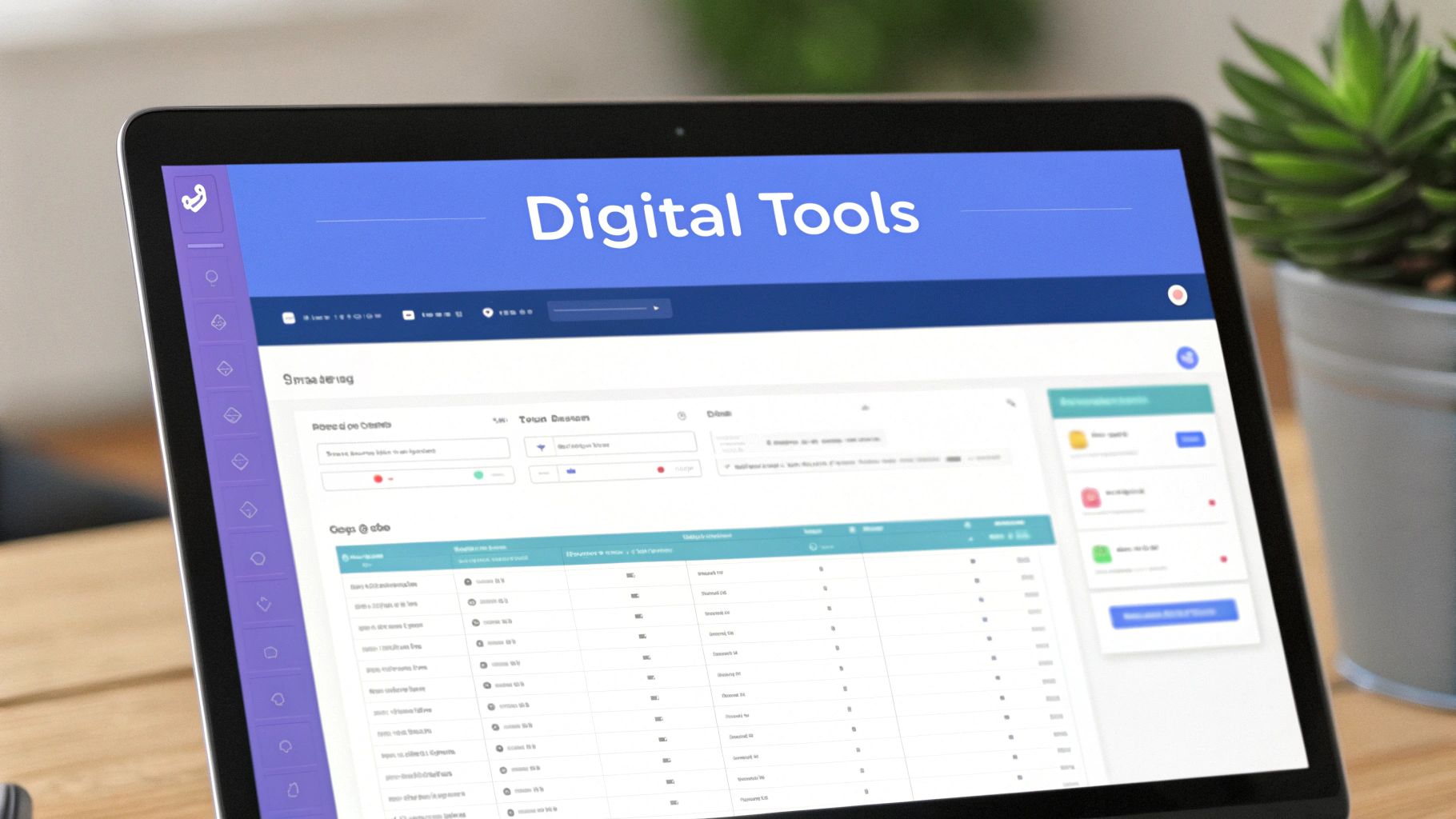
Why Contract Management Makes or Breaks Small Businesses
Effective contract management is crucial for small businesses. It directly impacts profitability, minimizes risks, and boosts overall efficiency. A well-managed contract isn't just a signed document; it's the foundation of a successful business relationship, ensuring clear terms and preventing future misunderstandings and disputes.
The Impact of Effective Contract Management
Robust contract management processes can significantly improve a small business’s bottom line. Imagine a small bakery securing a contract with a local coffee shop chain. Proper management ensures timely deliveries and consistent product quality, leading to increased revenue and a stronger partnership. Additionally, effective contract management mitigates the risk of legal disputes, which can be financially devastating for smaller businesses.
Many small businesses struggle with manual contract management. These traditional methods often involve scattered files, missed deadlines, and a lack of organization. This can lead to lost revenue, strained business relationships, and legal vulnerabilities. In contrast, businesses prioritizing and streamlining their contract processes often experience greater stability and more growth opportunities.
The financial health and smooth operation of small businesses are directly tied to sound contract management. Historically, these businesses have wrestled with inefficient, error-prone manual processes. The growing contract management software market reflects the shift towards automated solutions. The U.S. market, valued at $990 million in 2023, is projected to reach $2.5 billion by 2029, demonstrating a 16.52% CAGR. This move towards automation aims to reduce administrative costs, which can decrease by 25-30% with the use of such software. Furthermore, 81% of surveyed businesses plan to adopt contract automation software. This global trend anticipates the worldwide market reaching $8.24 billion by 2029, driven by technologies like AI and blockchain. More detailed statistics can be found here: https://www.b2breviews.com/contract-management-statistics/
Building a Foundation for Growth
Proper contract management isn't just about avoiding problems; it’s about building a foundation for sustainable growth. Organized contract systems free up time and resources, creating opportunities for expansion. This allows small businesses to focus on core activities like product development and customer service, instead of being bogged down by administrative tasks. Well-maintained contracts also provide valuable insights into business performance, identifying areas for improvement and potential new revenue streams.
In conclusion, thriving small businesses recognize the vital role of streamlined contract processes. Effective contract management empowers them to confidently navigate complex agreements, mitigate potential risks, and seize growth opportunities. It's a long-term investment that pays dividends, ensuring stability and paving the way for a prosperous future.
Navigating Contract Chaos: Real Challenges Small Businesses Face

The infographic above shows a small business owner reviewing contracts, emphasizing the importance of sound contract management. It visually represents how overwhelming this process can be. The image underscores that streamlined contract processes are essential for success.
Limited Legal Expertise and Resources
Legal complexities present a significant challenge for many small business owners. Limited budgets often restrict access to legal professionals. For example, a new startup may not be able to afford in-house counsel, leaving the owner to interpret complex legal terms, potentially exposing the business to risk. This lack of expertise can result in agreements with unfavorable terms or missed opportunities for negotiation.
Time Constraints and Competing Priorities
Small business owners wear many hats. Contract management often takes a backseat to other pressing tasks. Spending time reviewing contracts can feel impossible when also managing sales, marketing, and operations. This time crunch can lead to hasty reviews, overlooked clauses, and ultimately, costly errors. Check out our guide on How to master contract management challenges.
Inconsistent Processes and Lack of Organization
Many small businesses operate without formal contract management systems. Contracts might be scattered across different platforms and devices. This lack of centralized organization makes it difficult to track important dates, obligations, and even find specific contracts when needed. Inconsistent processes increase the risk of missed deadlines, unfavorable auto-renewals, and revenue loss.
Let's take a closer look at some specific pain points small businesses face when managing contracts. The following table summarizes common challenges, their impact, and potential solutions.
Top Contract Management Pain Points for Small Businesses
| Challenge | Business Impact | Traditional Solution | Modern Solution |
|---|---|---|---|
| Limited Legal Expertise | Unfavorable terms, missed negotiation opportunities, legal risks | Hiring expensive legal counsel | Using AI-powered contract review tools like Legal Document Simplifier |
| Time Constraints | Rushed reviews, overlooked clauses, costly mistakes | Delegating tasks, prioritizing | Automating contract review and management processes |
| Inconsistent Processes | Missed deadlines, lost contracts, difficulty tracking obligations | Implementing manual tracking systems | Utilizing cloud-based contract management software |
| Lack of Organization | Difficulty locating contracts, wasted time, increased risk of errors | Physical filing systems | Centralized digital contract repositories |
This table highlights how modern solutions, often leveraging technology, can address long-standing contract management challenges more efficiently and effectively than traditional methods.
The Enterprise vs. Small Business Divide
Large enterprises typically have dedicated legal teams and sophisticated software. Small businesses, however, operate with significantly fewer resources. Standard contract management solutions are often too complex or expensive for smaller operations. Furthermore, small businesses require solutions that cater to their unique challenges, such as limited legal expertise and time constraints.
Real-World Consequences
The impact of poor contract management can be severe for small businesses. Missed renewal deadlines can lead to lost opportunities. Unfavorable clauses can result in financial losses. For example, a small business might unknowingly agree to terms that restrict pricing adjustments or expansion. These seemingly minor oversights can significantly affect long-term viability. Effective contract management is not just a good idea—it's crucial for survival and growth.
Building Your Small Business Contract System That Actually Works

This image showcases how organized contract management can bring clarity and efficiency to small businesses. Easy access to important documents and streamlined processes are key. Let's explore how to build such a system.
Standardized Templates: Your First Line of Defense
Standardized contract templates are essential for efficient contract management. Create pre-approved documents for common agreements like sales contracts, Non-Disclosure Agreements (NDAs), and service agreements. This ensures consistent language, reducing ambiguity and legal disputes. Plus, templates save time by eliminating the need to start from scratch.
Streamlined Approval Workflows: Avoiding Bottlenecks
Clear approval workflows are crucial to prevent delays. Define who approves each contract type. A sales contract might require approval from a sales manager, legal counsel, and a finance representative. This creates accountability and prevents contracts from getting lost.
Centralized Repository: Ending the Contract Hunt
A centralized contract repository is invaluable. Having all contracts in one secure location eliminates the hunt for misplaced documents. This saves time and reduces stress. It also simplifies tracking key dates, obligations, and contract performance. This can be a shared cloud storage folder or dedicated contract management software.
Balancing Legal Protection and Efficiency
Balancing legal protection and efficiency is key. While legal soundness is paramount, overly complex processes can hinder operations. Find ways to simplify your system without compromising legal integrity. Learn more in our article about How to Master Contract Management Best Practices.
Scaling with Growth: A System That Adapts
Your contract management system must be scalable. As your business grows, so will your contracts. Your system should handle this increase without becoming cumbersome. This could mean using advanced software or improving your team's contract management skills.
Stakeholder Visibility: Keeping Everyone Informed
Maintaining stakeholder visibility is crucial. Everyone involved should know their responsibilities and deadlines. Regular updates and clear communication prevent misunderstandings. This doesn't require endless meetings; online dashboards or automated emails can work.
Building on Success: Continuous Improvement
Effective contract management requires continuous improvement. Regularly review your processes and find areas to optimize. Gather team feedback, analyze contract performance, or use new technologies to automate tasks. This ensures your system stays effective as your business evolves.
You might be interested in: How to master contract management best practices
By following these strategies, small businesses can establish a robust and efficient contract management system that offers strong legal protection and supports smooth operations.
Tech Tools Transforming Small Business Contract Management
Technology has made contract management much more accessible to small businesses. Cloud-based solutions now offer features that were once only available to large corporations. This allows smaller companies to manage contracts efficiently, minimize risks, and improve their bottom line.
Choosing the Right Software for Your Needs
Choosing the right software depends on your specific requirements and available resources. A simple document management system might be enough for basic organization. But if you need advanced features like automated reviews and data analysis, then an AI-powered contract platform might be a better choice. Consider your budget, the number of contracts you handle, and whether the software integrates with your existing systems.
For businesses looking to streamline their operations, an effective contract system might include tools like Automated Quality Management. This can improve various business processes, including contract management.
From Document Storage to AI-Powered Insights
The variety of contract management tools is extensive. Some platforms offer basic document storage and e-signatures. Others provide automated contract creation, review, and analysis, helping you identify potential risks and opportunities. AI-powered solutions can even predict contract outcomes and suggest optimal terms.
The impact of technology on small business contract management is significant. Emerging trends highlight the growing use of AI, machine learning, and blockchain in contract management systems. For instance, AI automates tasks like contract review and compliance checks, boosting efficiency and minimizing legal risks. Machine learning can predict outcomes and optimize terms, while blockchain is being explored for secure and transparent smart contracts. These technologies are improving speed and accuracy while enhancing collaboration and compliance.
In 2025, the global contract management software market is projected to reach $4.67 billion, up from $4.04 billion, demonstrating a 15.6% compound annual growth rate (CAGR). This growth underscores the rising reliance on technology to improve contract processes and overall business performance. You can find more detailed statistics at Fynk.
Implementation and Integration: Smooth Transitions
Implementing new software can be a challenge. Begin with a clear understanding of your needs. Make sure the solution you choose integrates seamlessly with your existing CRM, accounting software, and other business tools. Provide training to your team to ensure everyone can use the new system effectively.
Realistic ROI: Measuring the Benefits
Contract management software offers significant benefits, but it's important to have realistic expectations about your return on investment (ROI). The payoff may not be immediate. Track important metrics like shorter contract cycle times, better compliance rates, and lower legal costs over time.
AI Capabilities for Small Businesses
AI features are becoming increasingly accessible to smaller businesses. Tools like automated contract analysis can help identify hidden risks and opportunities, even without a technical background or a large investment. This can be particularly helpful for businesses that don't have in-house legal experts. These tools are leveling the playing field, giving smaller businesses access to the same valuable insights previously enjoyed by larger corporations.
Example: Comparing Contract Management Solutions
To help illustrate the variety of options available, the following table compares different contract management software solutions suitable for small businesses.
To help you choose the best contract management software, here’s a comparison of some popular options based on price, features, and suitability for small businesses:
| Software | Price Range | Key Features | Best For | Setup Complexity |
|---|---|---|---|---|
| Legal Document Simplifier | Pay-as-you-go, Pro, Enterprise | AI-powered summarization, key term detection, risk alerts | Businesses needing clear, concise summaries and risk analysis | Easy |
| PandaDoc | Varies based on plan | E-signatures, document creation, workflow automation | Businesses needing efficient document workflows | Easy |
| DocuSign | Varies based on plan | E-signatures, contract lifecycle management, integrations | Businesses with high contract volumes | Moderate |
| Concord | Varies based on plan | AI-driven contract drafting, negotiation support, compliance tracking | Businesses requiring sophisticated contract automation | Complex |
This table highlights how various solutions cater to different needs and budgets. By carefully considering your specific requirements, you can find the right tool to streamline your contract management processes.
Your 90-Day Contract Management Transformation Plan
Transform your contract processes without disrupting your business. We'll guide you through a phased implementation plan with 30, 60, and 90-day milestones, starting with an honest assessment of your current situation. You'll learn practical ways to handle document gathering, template creation, and team training without overwhelming your busy team. Each phase includes realistic timeframes, resource needs, and solutions to potential problems. This guide focuses on gradual improvement designed for small businesses—because you need solutions that work while you're actively running your company.

Phase 1: First 30 Days - Foundation Building (Centralization & Assessment)
The first phase concentrates on taking control of your existing contracts. This involves bringing all your contracts together in one secure place. This could be a shared cloud drive like Dropbox or a dedicated contract management system. This initial step creates a vital foundation for everything that follows. You should also conduct an audit to understand your current contract types, common clauses, and who your key stakeholders are.
This assessment will highlight problem areas and opportunities for improvement. A simple spreadsheet listing contract type, important dates, and involved parties can be surprisingly helpful. This phase should take about 10-15 hours of focused work.
Phase 2: Days 30-60 - Template Creation and Workflow Implementation
The second phase builds upon the groundwork laid in the first 30 days. Now, concentrate on creating standardized contract templates for your most frequently used agreements. For example, create templates for sales contracts, non-disclosure agreements (NDAs), and service agreements. These templates ensure consistency and minimize legal risks.
Next, introduce simplified approval workflows. Clearly define who needs to approve which types of contracts. This prevents hold-ups and accelerates the entire contract lifecycle. This phase might require 20-25 hours spread throughout the month.
Phase 3: Days 60-90 - Training and Automation
The final phase focuses on team training and exploring automation options. Train your team on the new processes, templates, and any new software you've implemented. Make sure everyone understands their roles and responsibilities in the contract management process. This encourages acceptance and smooths the transition.
Begin exploring simple automation options. This could include using software features for automated reminders or setting up email alerts for key dates. This last phase will likely need another 15-20 hours and represents the start of ongoing improvements to your contract management.
This is also a good time to revisit your initial assessment and evaluate your progress. Have you shortened the time it takes to finalize contracts? Are your contracts better organized? The answers to these questions will inform future improvements.
By following this phased approach, small businesses can significantly improve their contract management within just 90 days. This creates a strong base for continued improvement and business growth. Remember, effective small business contract management is an ongoing process, not a one-time fix.
Measuring Success: Does Your Contract Management Actually Work?
You've implemented a contract management system for your small business. But how can you tell if it's really making a difference? This section explores the key metrics that indicate true improvement, moving beyond vague notions to concrete, measurable results.
Key Performance Indicators (KPIs) for Contract Management
Several Key Performance Indicators (KPIs) offer a way to assess your contract management effectiveness. Time-to-signature is a critical metric. This measures how long it takes to complete a contract, from initial drafting to final signature. A shorter cycle time usually signifies improved efficiency.
Another important KPI is the compliance rate. This gauges how well your contracts adhere to both regulatory and internal requirements. A higher compliance rate points to lower risk. You might find this resource helpful: How to master contract risk management processes.
Finally, consider risk mitigation. This involves identifying and addressing potential legal problems during the contract review process. A rise in identified and resolved risks indicates a more proactive and effective management approach.
Tracking and Measuring Progress
Keeping track of these KPIs doesn't require sophisticated software. Simple spreadsheets can be very effective. Monitor time-to-signature by recording the start and end dates for each contract.
Track compliance by documenting any instances of non-compliance and the steps taken to resolve them. For risk mitigation, log the number of potential issues discovered and the actions taken to address them. Regular review of these records will offer valuable insights into your progress.
Demonstrating ROI: Showcasing the Value
Demonstrating a return on investment (ROI) from improved contract management is essential. Show how shorter contract cycle times translate into faster revenue recognition. Highlight how better compliance rates and lower legal costs bring tangible financial benefits.
Presenting these improvements to stakeholders and team members underscores the value of effective contract management. It reinforces the importance of the processes you’ve put in place.
Real-World Examples: Small Business Success
Many small businesses have realized substantial gains from improved contract management. One small consulting firm, for example, cut its contract cycle time by 50%. This resulted in quicker project starts and increased revenue. Another small business boosted its compliance rate to 95%, minimizing the risk of penalties and legal disputes. These real-world examples illustrate the tangible positive impact of effective contract management.
Improve your contract management today with Legal Document Simplifier. Our AI-powered platform helps you understand complex legal documents quickly and efficiently. We offer clear, concise summaries, automated key term detection, risk alerts, and more. Start simplifying your contracts today!